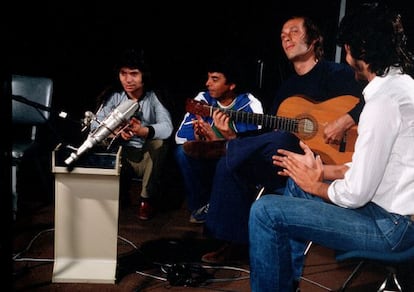Camarón: back for one last bulería
Paco de Lucía and Tomatito provide guitar backing on a version of a song by the late flamenco legend that has been rescued from the archives


He didn't have fans, he had worshippers. The legacy of Camarón de la Isla is inexhaustible, and 20 years after his death the world of flamenco has yet to find another singer who can topple him from his throne.
Every Camarón-related anniversary and salient date in the calendar is observed with a new compilation of his music or a collection of previously unreleased archive material.
Most recently, while the City of San Fernando (his hometown in Cádiz) announced the purchase of Camarón's family home to save it from ruin and turn it into a foundation, Paco de Lucía and Tomatito were making a joint recording of one of the singer's bulerías to include in Tomatito's newest album. Meanwhile, Universal is preparing a major guitar tribute to the cantaor in the fall.
The recording took place a few weeks ago at Paco de Lucía's studio in Mallorca. Tomatito traveled to the island with a master recording of an old bulería by Camarón that had been rescued from the archives, and an ancient ritual was repeated: both men put their guitars at the service of the singer with whom they both began making their names and who they both continue to miss.
We live outside of flamenco laws," Camarón said on one occasion
The pair were his main guitarists both on stage and on his albums, and even though the careers of Paco de Lucía and Tomatito have continued to grow since then, returning to Camarón is always a joyful event for them, something of a return to better times.
Of the many geniuses with whom De Lucía has worked across the world, the guitarist always says Camarón was the best. Back in the 1960s, for a Gypsy like Camarón and a non-Gypsy like De Lucía to be seen performing together was considered a great sensation.
In 1969 they recorded Al verte las flores lloran, their first album together, which marked the beginning of a great friendship and partnership that, save for works such as La leyenda del tiempo, encompassed nearly the singer's entire career.
"We live outside of flamenco laws," said Camarón on one occasion. In Tomatito's case, his relationship with the singer began when he was still under age and Camarón had to ask his father for permission to take him on tour. The guitarist spent the next 18 years with him, and Camarón's death nearly forced him into professional retirement. However, he eventually resurfaced as a great guitarist.
There were never any moments of tension among the flamenco trio
In the 1981 recording Como el agua, the three men debuted as a performing trio and there were never any moments of tension between two of the most important figures of flamenco guitar.
Camarón's voice sounds at once sweet and cutting on the recording, and the guitar duel creates a sound that went down in musical history. From the very beginning, De Lucía thought it right for the guitarist who had first accompanied Camarón to be present at that recording. That was the beginning of a friendship and a mutual admiration that has remained steady throughout the years.
De Lucía had already used an original master recording of Camarón's for a cut in his album Cositas buenas, so doing the same thing for Tomatito's album seemed like a good follow-up.
De Lucía, who has lately collaborated with Miguel Poveda and Estrella Morente on their own albums, gladly accepted Tomatito's invitation to be a guest performer on his new album.
The song in question comes from the remains of an old album called Te lo dice Camarón. Rehearsals in Mallorca involved introducing new guitars to turn the song into a bulería, and when the song was to their liking, they traveled to Madrid for the final recording with new voices and choruses. The video of the event shows both guitarists looking older but relaxed.
When Tomatito's album goes on sale after the summer, Universal will also be launching Con Camarón, a selection of the singer's more obscure performances for the television stations Televisión Española and Canal Sur.
These recordings show him playing together with major figures of the genre, including not only Tomatito and De Lucía, but also Sabicas, Raimundo Amador, Rafael Amador, Ramón de Algeciras, Juan Habichuela and Niño Miguel.
These are the original recordings, without any improvements or changes made. The idea, says Fernando Crespo, of the Universal label, was to rediscover the "most smiling, purest Camarón."
But even legends suffer the effects of the crisis. Sales of his albums, which used to shift over 100,000 copies, are down to 20,000, although in the current situation that remains a considerable figure.
Tu suscripción se está usando en otro dispositivo
¿Quieres añadir otro usuario a tu suscripción?
Si continúas leyendo en este dispositivo, no se podrá leer en el otro.
FlechaTu suscripción se está usando en otro dispositivo y solo puedes acceder a EL PAÍS desde un dispositivo a la vez.
Si quieres compartir tu cuenta, cambia tu suscripción a la modalidad Premium, así podrás añadir otro usuario. Cada uno accederá con su propia cuenta de email, lo que os permitirá personalizar vuestra experiencia en EL PAÍS.
¿Tienes una suscripción de empresa? Accede aquí para contratar más cuentas.
En el caso de no saber quién está usando tu cuenta, te recomendamos cambiar tu contraseña aquí.
Si decides continuar compartiendo tu cuenta, este mensaje se mostrará en tu dispositivo y en el de la otra persona que está usando tu cuenta de forma indefinida, afectando a tu experiencia de lectura. Puedes consultar aquí los términos y condiciones de la suscripción digital.








































